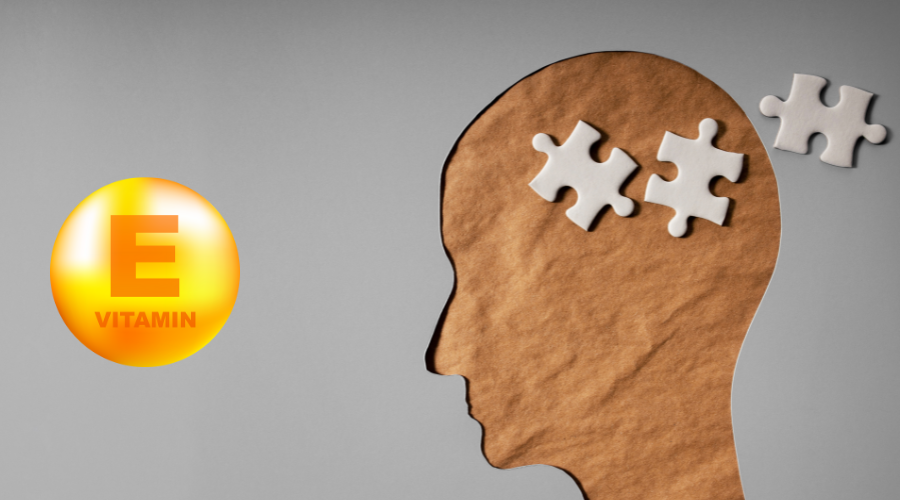Is Vitamin E Good for Brain Function?
It has long been well-established that, Vitamin E is central to brain function. Being a fat-soluble nutrient its primary role in the human body is to protect cells from harm caused by free radicals. But, exactly how Vitamin E supports brain function hasn’t been clear.
In this blog, we’ll explore the role of Vitamin E in brain health and learn the various ways in which vitamin E influences brain health, shedding light on its potential benefits in preventing cognitive decline and age-related neurodegenerative diseases.

How Vitamin E Protects Brain Cells from Oxidative Damage?
Oxidative stress occurs when there is an imbalance between the production of free radicals and the ability of the body to neutralize them. Free radicals are highly reactive molecules that can damage cells, and lead to various health issues.
Vitamin E is the king of antioxidants. As a fat-soluble vitamin, it can efficiently penetrate the cell membrane and safeguard the delicate structures within brain cells from harmful free radicals. By scavenging these damaging free radicals, vitamin E may help prevent cellular neural damage, and ultimately, neurodegenerative disorders.
As per various studies, oxidative stress has been linked to the pathogenesis of brain function-related conditions. Vitamin E's antioxidant activity can potentially slow down the progression of several neurodegenerative disorders by protecting brain cells from oxidative damage. As a result, Vitamin is well-known to be the best vitamin for brain health.

Also read: Vitamin E for Fatty Liver - How Much Vitamin E is Good for Your Liver?
6 Reasons Why Vitamin E is Amongst the Best Vitamins for the Brain
The brain is a highly metabolically active organ. It requires a constant supply of nutrients to fuel its functions. Nutrient concentrations, particularly those of vitamins, are closely linked to cognitive performance.
Various studies have highlighted the positive impact of vitamin E on cognitive function, suggesting that vitamin E deficiencies in certain vitamins can potentially impair brain health and lead to cognitive decline.
Furthermore, it has been found to promote healthy blood flow to the brain, support the formation of protective membranes around nerve cells, and assist in neurotransmitter production, all of which contribute to optimal brain function. Regular Vitamin E intake has been associated with a potentially reduced risk of developing cognitive decline. Let’s learn why Vitamin E is the best vitamins for brain health:
1. Preserving Cell Membranes:
Cell membranes serve as a barrier, regulating the flow of nutrients and waste in and out of cells. Vitamin E's potent antioxidant properties prevent the oxidation of polyunsaturated fatty acids in these membranes, supporting their integrity and preventing damage.
By preserving cell membranes, Vitamin E ensures optimal communication between brain cells, promoting healthy cognitive function and protecting against neurodegenerative diseases.
Also read: Vitamin E Tocotrienols: Everything You Need to Know
2. Supporting Neuroplasticity
Neuroplasticity refers to the brain's ability to reorganize and form new connections between neurons, crucial for learning, memory, and overall cognitive function.
Vitamin E plays a role in supporting neuroplasticity by protecting the brain's structural components from oxidative damage. By preventing the accumulation of harmful free radicals, Vitamin E helps maintain the plasticity of brain cells, facilitating the formation and retention of new connections. This protection is particularly significant in preventing age-related cognitive decline and neurodegenerative disorders.

3. Supports Brain Health in Aging:
As individuals age, the need for vitamins for the brain increases. Vitamin E's antioxidant effects are particularly beneficial in this regard, helping to protect the brain against age-related damage and maintaining cognitive function. By supporting the health of brain cells, Vitamin E can play a crucial role in ensuring a healthier, more active brain during the aging process.

4. Encourages Brain’s Repair Mechanism
Following injury, the brain's ability to repair itself is crucial. Vitamin E has been shown to support the brain's repair mechanisms, partly due to its antioxidant properties. By reducing oxidative damage, Vitamin E supports the healing process, highlighting its role in the recovery and maintenance of brain health after injury.
Moreover, the presence of Vitamin E in the diet or through supplementation ensures that the brain has the necessary support to recover effectively. This not only highlights the importance of Vitamin E in the maintenance of brain health after an injury but also underscores the broader significance of vitamins for brain health.
Also read: Tocotrienols Vitamin E or Tocopherols
5. Enhances Cognitive Function
Vitamin E plays a pivotal role as one of the best vitamins for brain health by safeguarding cell membranes against oxidative stress. This protection is essential for maintaining cognitive functions, particularly in aging individuals.
Studies have linked adequate Vitamin E intake with slower cognitive decline, showing its potential to preserve memory and enhance brain processing speed. By combating oxidative stress, Vitamin E helps in maintaining the integrity of neuronal structures, ensuring optimal cognitive performance.

6. Anti-inflammatory effects
In the brain, oxidative damage can lead to inflammation, a process that plays a critical role in the development and progression of various neurological disorders. By scavenging free radicals, vitamin E prevents the oxidation of important molecules in the brain, including lipids and proteins. Additionally, it helps regenerate other antioxidants, such as vitamin C and glutathione, further enhancing the brain's defense against oxidative stress.
Studies have also indicated that supplemental vitamin E, especially Tocotrienol form, may have a beneficial role in other neurological and neuromuscular conditions. By reducing oxidative damage and inflammation, vitamin E supplementation has shown promise in various brain-related conditions.

Also read: How to Choose Tocotrienols: A Brief Guide
7. Improves Blood Flow to the Brain
Adequate blood flow is essential for brain function, supplying oxygen and nutrients necessary for cognitive processes.
Vitamin E, known as one of the best vitamins for the brain, has been associated with improved blood flow to the brain. This improvement supports cognitive function and brain health, emphasizing the importance of Vitamin E in maintaining cerebral circulation.
Effect of Vitamin E Deficiency on Brain Function
When the body lacks sufficient Vitamin E, it may lead to cognitive decline, including problems with memory and concentration. Thus, incorporating the best vitamins for brain health into one's diet is vital for long-term brain wellness.
The vitamins for the brain, like Vitamin E, assist in maintaining the integrity of cell membranes in the nervous system, playing a pivotal role in neuron protection against oxidative stress. This is why Vitamin E is often considered among the best vitamins for brain function improvement and maintenance. A deficiency in this vital nutrient can lead to neurological problems, including balance issues and coordination difficulties, underscoring the importance of ensuring adequate intake for optimal brain health.
Therefore, to prevent the adverse effects of Vitamin E deficiency, it is crucial to focus on a diet rich in vitamins for brain health. Foods like nuts, seeds, and leafy green vegetables are excellent sources of Vitamin E.
For those unable to meet their needs through diet alone, supplements may serve as a valuable source of the best vitamins for brain wellness, promoting not only cognitive health but also overall well-being.
Final Words!
In summary, Vitamin E emerges as a critical component among vitamins for brain health, playing a vital role in supporting cognitive function. Its benefits, ranging from preserving cell membranes to improving blood flow and offering anti-inflammatory effects, underscore its importance in maintaining cognitive health and preventing neurodegenerative diseases.
Therefore, proper intake of Vitamin E, through diet or supplements, is essential for supporting brain health, especially as we age. Making sure to include foods rich in Vitamin E, such as nuts, seeds, and leafy greens, can help ensure we meet our nutritional needs for optimal brain function.
Disclaimer: These statements have not been evaluated by the FDA. The information contained within this page is for educational purposes only. It is not intended to replace the advice or attention of health care professionals.
Further Readings –
How to Choose Tocotrienols: A Brief Guide



















